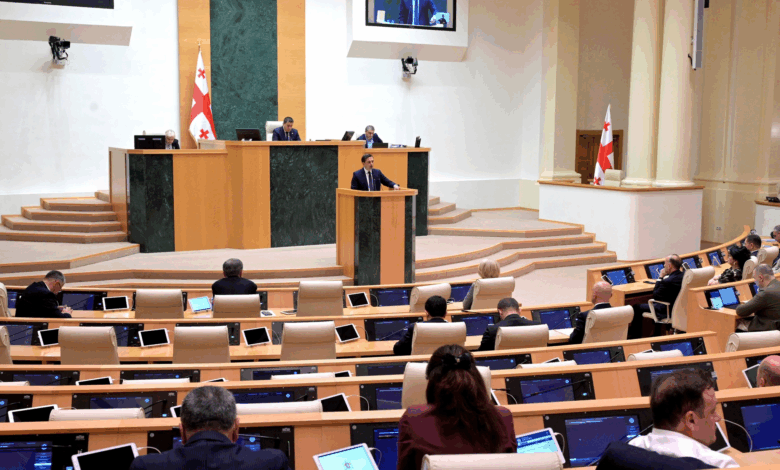
GD Lawmakers Bicker with Ombusman in Parliament
When Levan Ioseliani, the Georgian Public Defender, returned to the parliament tribune on June 10 after a break for questions, he had two main impressions to share.
“I have an impression that with opposition absent in this hall, you decided to take it out on me,” the ombudsman told Georgian Dream’s one-party parliament, which has been boycotted by the opposition since the disputed 2024 parliamentary vote.
His other impression was the expectation that “when I present a report, I am supposed to talk about some positive issues.” The ombudsman defended himself, saying he deliberately skipped the positive parts “to draw your attention to problematic issues.”
Ioseliani had presented the 2024 Report on the State of Human Rights and Freedoms in the Country, a 390-page document that outlines major issues from Georgia’s past turbulent year. 2024 saw two major protest waves, to which authorities have responded with force and repression. The public defender’s report draws attention to various abuses, including police violence and impunity, and worsening of media freedom and journalists’ rights.
- Read More: Public Defender’s 2024 Human Rights Report
Georgian Dream MPs were unhappy with many of Ioseliani’s findings, bombarding him with questions and criticism. They were particularly dissatisfied that Ioseliani left out “positive trends” and chose not to talk about what they saw as abuses towards police officers and state or ruling party officials. Ioseliani was also repeatedly asked whether the staff hired during his predecessors’ tenures were influencing his findings.
“You are ashamed to defend us,” GD MP Tea Tsulukiani, who had served as justice minister and culture minister and now heads a controversial commission investigating alleged crimes of United National Movement rule, told Ioseliani. “Property rights have been violated against lawmakers, their family members, to say nothing about Bidzina Ivanishvili, but you are ashamed to talk about it,” she went on, “human rights law is about balance, and you have fully missed this balance.”
In the two rounds of questions, lawmakers repeatedly brought up the case of GD MP Mariam Lashkhi and the May 17 café incident, which resulted in administrative detentions of two female student activists. Lashkhi sued the activists over alleged insult after they chanted protest phrases (“No to Russian regime”, “Down with Russian slaves”) in a café where Lashkhi was staying with her underage children. Several activists have been fined or detained on similar charges over the past weeks, with Georgian Dream recently announcing it was also suing critics for what it sees as offensive posts on social media.
“When you talk about the rights of demonstrators being violated, shouldn’t you mention an injured police officer at least once?” Tsulukiani told Ioseliani. “When you talked about children, why haven’t you said anything about Mariam Lashkhi’s children at least once?”
Irma Zavradashvili, another GD lawmaker, further criticized the report for not being “a report by every citizen’s Public Defender.” Apparently pointing at the number of Georgian Dream voters per contested official results of 2024 parliamentary elections, Zavradashvili said that “there are more than 1,2 million people to whom it would have been important to have a feeling after your today’s report that you will also defend their positions.”
The ombudsman responded to criticism by saying that a public defender’s mandate involves defending “human rights from the state” rather than the state itself, citing laws and “the spirit of constitutional provision.”
“If the state breaches your rights, I will definitely defend [your rights],” Ioseliani told Tsulukiani.
Police Brutality and Journalists’ Rights
First to ask Ioseliani a question was GD MP Nino Tsilosani, who said she “found it strange” when the ombudsman brought up “unacceptable actions” of police against journalists.
“I haven’t seen a single fact of anything incorrect on the part of police towards journalists,” Tsilosani said, noting that “for weeks police officers were protecting this country, this country’s stability and the safety and peace, peaceful life of each citizen.” If there were a few such cases, they “cannot be generalized,” Tsilosani said.
Ioseliani said in response that there were “countless examples” of such abuses against journalists, including in the report. The ombudsman also responded to criticism about him not defending police rights by saying no police officer has been held accountable for the documented abuses.
“We’ve seen people beaten, people detained, but even in the cases when it is visible who carries out the beating, I mean a police officer, can you name a single case when any of the police officers was held responsible?” Ioseliani said. “There is no such case,” he noted, adding that “justice cannot be one-sided.”
Lomjaria’s Legacy and ‘Reorganization’
During the hearing, GD lawmakers repeatedly brought up the legacy of Nino Lomjaria, Ioseliani’s predecessor in the post of the public defender, whose office, Tsilosani said, “ruled this institution with the hands of agents.” Ioseliani was asked whether it was Lomjaria’s staff who were still influencing him.
“I am sure … you don’t lack professionalism. It’s probably the staff’s fault that they are handing you the issues selectively,” Tsulukiani told Ioseliani, asking whether he conducted a reorganization and if not, why. “Is it that you are still working with the staff of Ms. malevolent Lomjaria and leaving us to rely on them?”
The reorganization questions come as Georgian Dream authorities have initiated “reorganization” in several ministries, with the procedure widely seen as a pretext to purge the civil service of critical public employees.
“I don’t think that if people do their job conscientiously, I should judge their future according to in whose tenure they’ve been hired and that this has to become the ground for reorganization,” Ioseliani said in response to questions.
Also Read:
- 02/06/2025 – Public Defender Says FARA Not Inherently “Undemocratic”, Will Monitor Its Applicaiton
- 16/01/2025 – Public Defender Tells Court Amaghlobeli’s Detention Unjustified